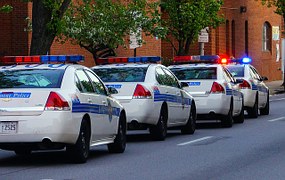 State regulators recently did away with an archaic restriction that cost hundreds of otherwise qualified applicants the opportunity to become Maryland law enforcement officers. In a landslide 16 to 1 vote the Maryland Police Training and Standards Commission eliminated the unreasonable restriction, which previously prevented anyone who had smoked pot more than 20 times in their life, or more than 5 times since turning 21, from becoming a sworn police officer. The plea to ease the 40-year old restriction originally came from the Baltimore Police commissioner, who had witnessed an unprecedented exodus of city cops in the wake of the 2015 civil unrest and resulting disdain toward law enforcement. The commissioner has maintained that prior marijuana use has consistently been the main disqualifier of new applicants to the force, with 30 applications already being tossed aside in the first few months of 2017 over prior pot use.
State regulators recently did away with an archaic restriction that cost hundreds of otherwise qualified applicants the opportunity to become Maryland law enforcement officers. In a landslide 16 to 1 vote the Maryland Police Training and Standards Commission eliminated the unreasonable restriction, which previously prevented anyone who had smoked pot more than 20 times in their life, or more than 5 times since turning 21, from becoming a sworn police officer. The plea to ease the 40-year old restriction originally came from the Baltimore Police commissioner, who had witnessed an unprecedented exodus of city cops in the wake of the 2015 civil unrest and resulting disdain toward law enforcement. The commissioner has maintained that prior marijuana use has consistently been the main disqualifier of new applicants to the force, with 30 applications already being tossed aside in the first few months of 2017 over prior pot use.
The modified rule still places a restriction on past marijuana use, but it is a far more reasonable one. Rather than place an arbitrary number on the amount of times a person has smoked, the commission chose to impose simple mandatory three-year clean period. The Office of the Attorney General has already reviewed the modified regulation and starting June 1st only applicants that have used marijuana in the last three years will be barred by the state from becoming law enforcement officers. Individual police departments are free to choose to impose tougher restrictions if they choose, but in light of changing pot policy around the state and country it is unlikely that many will exercise this right. One thing we know for sure is that the state’s largest police department in Baltimore will not pursue tougher restrictions.
Despite the apparent show of flexibility by the police training and standards commission, the idea that prior casual pot smoking would bar someone from future employment is still asinine. It’s one thing if a department issues a drug test and the applicant fails, as the recreation use of marijuana is still illegal. But a three-year bar seems like pandering to the dwindling but still present establishment that cannot get over the illogical stigma attached to marijuana. Most of these establishment types reside in law enforcement or in the military, and are often those who drink two beers or whiskeys a day without giving it a thought. Alcohol is completely accepted if not promoted in the law enforcement and military culture despite the negative impact it has on thousands of individuals and their families each year. On the other hand the casual use of marijuana can cost a soldier, cop or federal agent his or her career. We are not in a place yet where marijuana is accepted on the same level as beer or liquor, but at least the new police regulations are a step in the right direction.
Benjamin Herbst is criminal defense lawyer that specializes in drug and alcohol related offenses. He has successfully defended hundreds of clients in charges ranging from DWI to narcotics distribution and is available anytime for a free consultation.
Resources
Maryland regulators ease restrictions on past marijuana use by prospective police officers, baltimoresun.com.
 Criminal Defense Lawyer Blog
Criminal Defense Lawyer Blog

